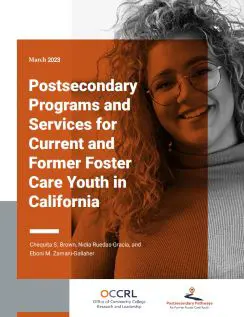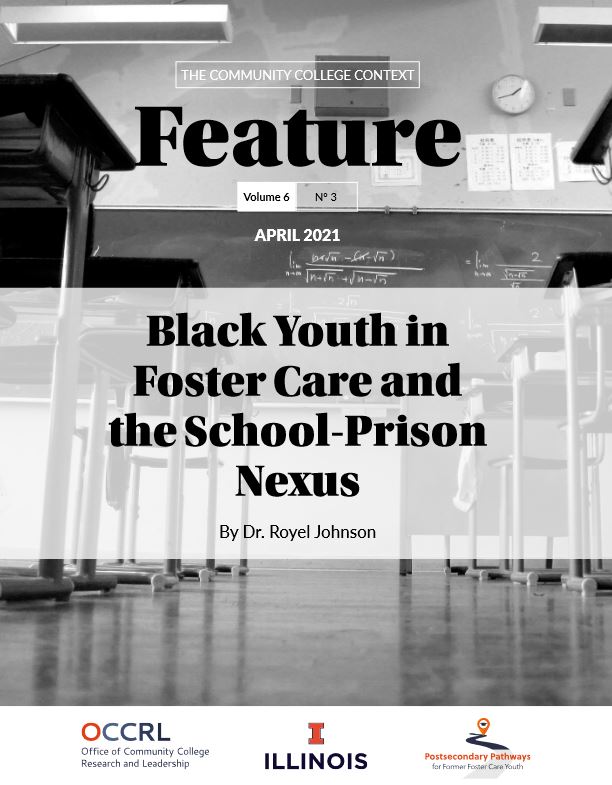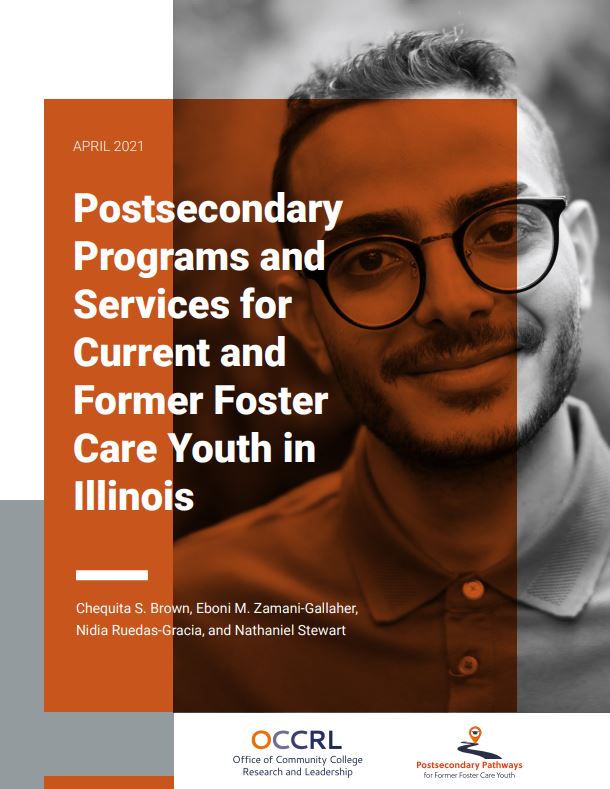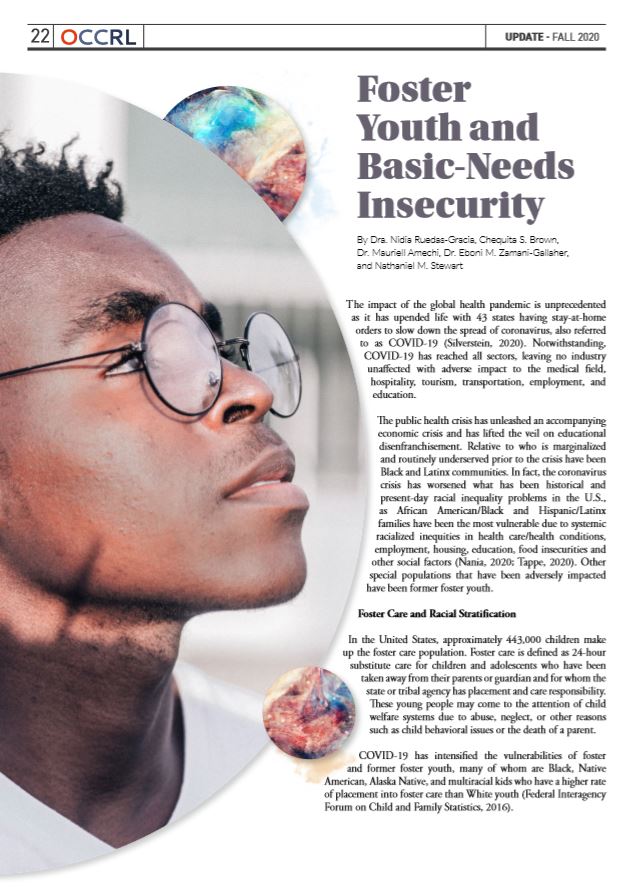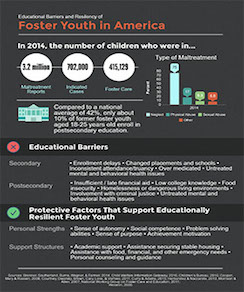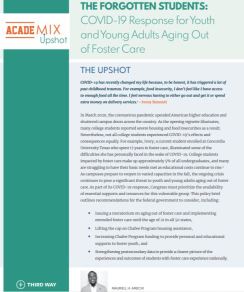
Postsecondary Pathways - for Former Foster Care Youth
This project has been completed and is no longer active.
However, we hope you are able to utilize its resources.
The Postsecondary Pathways for Former Foster Care Youth (PP-FFCY) reflects OCCRL’s commitment to examining and developing postsecondary pathways that support mobility for first-generation, underserved, and minoritized populations, as well as strengthening career pathways to promote seamless transitions from college to careers. This project endeavors to examine postsecondary access, opportunities, and supports for foster youth in Illinois and other states across the county in addressing access and outcomes of FFCY in Career Technical Education (CTE).
Purpose
The Postsecondary Education Pathways for Former Foster Care Youth (PP-FFCY) project is an exploratory study focused on postsecondary pathways for current and former foster youth in Illinois. OCCRL is conducting a comprehensive-needs assessment that provides a descriptive profile of current and former foster youth populations in Illinois; examines postsecondary access, opportunities, and supports for foster youth in Illinois; and addresses disparities in career and technical education (CTE) programs. This project reflects OCCRL’s commitment to examining and developing postsecondary pathways that support mobility for first-generation, underserved, and minoritized populations as well as strengthening and supporting career pathways to promote seamless transitions from college to careers.
Resources
OCCRL aims to increase postsecondary awareness, access, and attainment for current and former foster care youth by providing information on programs and other resources that offer holistic support and services. View the list of postsecondary programs and services.
Strategies to Cultivate a Foster-Friendly Culture on Community College Campuses
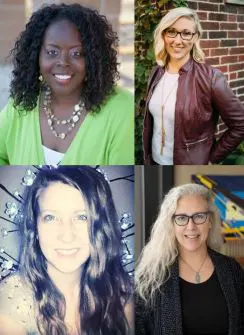 In this episode, Chequita Brown talks with Kate Danielson of the organization Foster Progress, as well as with Anna Wandtke and Tricia Wagner of Rock Valley College in Rockford, Illinois. The group discusses how to cultivate a foster-friendly culture at Illinois community colleges.
In this episode, Chequita Brown talks with Kate Danielson of the organization Foster Progress, as well as with Anna Wandtke and Tricia Wagner of Rock Valley College in Rockford, Illinois. The group discusses how to cultivate a foster-friendly culture at Illinois community colleges.
Navigating College as a Foster Care Alum
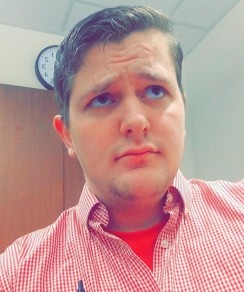 In this episode, OCCRL research assistant Chequita S. Brown talks with Jonathan Stacy, a sophomore at Heartland Community College who is pursuing his studies and a possible career in criminal justice.
In this episode, OCCRL research assistant Chequita S. Brown talks with Jonathan Stacy, a sophomore at Heartland Community College who is pursuing his studies and a possible career in criminal justice.
Listen to the podcast and view the transcript.
Key Elements to Successfully Connecting Foster Care Youth to Educational Resources for Postsecondary Success
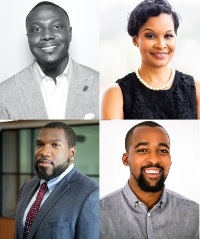 In this episode, Nathaniel Stewart talks with Mauriell Amechi, Regina Gavin Williams, and Blayne Stone Jr. about how the transitions and pathways to postsecondary education are similar and different for Black former foster care students. The scholars also discuss key elements to successfully connect foster care youth to educational resources that help advance the postsecondary education opportunities for this student population.
In this episode, Nathaniel Stewart talks with Mauriell Amechi, Regina Gavin Williams, and Blayne Stone Jr. about how the transitions and pathways to postsecondary education are similar and different for Black former foster care students. The scholars also discuss key elements to successfully connect foster care youth to educational resources that help advance the postsecondary education opportunities for this student population.
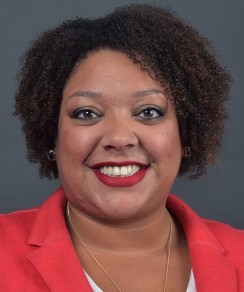
Maddy Day
The Impact of Campus-Based Support Programming on Foster Care Collegians' Postsecondary Access and Retention
In this episode, Chequita Brown of OCCRL talks with Maddy Day about the Fostering Success initiative in Michigan and the impact of campus-based support programming on foster carecollegians' postsecondary access and retention.
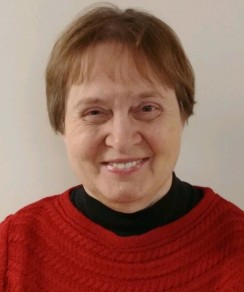
Patricia Palmer
How Youth-in-Care in Illinois Can Access Educational Resources to Pursue a Postsecondary Education
In this episode, OCCRL research assistant Chequita Brown continues the conversation on foster care youth by talking about with Patricia Palmer about accessing available resources in Illinois for youth-in-care who want to pursue a postsecondary education.
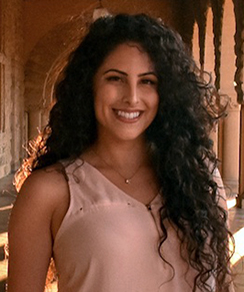
Nidia Ruedas-Gracia
Conceptualizing 'Sense of Belonging' Among Students From Historically Minoritized Racial Groups Within Higher Education
In this episode, Colvin Georges Jr., a research associate at OCCRL, talks with Dr. Nidia Ruedas-Gracia about what it means to have a sense of belonging and discusses her research in this area. They also discuss how a sense of belonging affects college students from historically minoritized racial groups.
Postsecondary Programs and Services for Current and Former Foster Care Youth in California
By Chequita S. Brown, Nidia Ruedas-Gracia, and Eboni M. Zamani-Gallaher
This brief highlights postsecondary programs and services in California that support youth in care, in addition to young adults who are aging out of foster care. Read more.
Tracking College-to-Career Pathways for Foster Youth
By Chequita S. Brown
In this OCCRL Thought Paper, Chequita S. Brown relates how tracking the data of students with foster care experience helps to recognize them as a legitimate student population. She offers recommendations on how to do this and conveys the many obstacles that can hinder the academic and career success of foster youth. Read more.
Black Youth in Foster and the School-Prison Nexus
By Royel Johnson
In this OCCRL Feature Brief, Dr. Royel Johnson argues that the foster care system, and more specifically congregate care facilities, are part and parcel to the enhancement of carceral state power. Read more.
Postsecondary Programs and Services for Current and Former Foster Care Youth in Illinois
By Chequita S. Brown, Eboni Zamani-Gallaher, Nidia Ruedas-Gracia, and Nathaniel M. Stewart
This research brief provides an overview of programs and services that helps strengthen postsecondary pathways for current and former foster youth in Illinois. Read more.
Foster Youth and Basic-Needs Insecurity
By Dra. Nidia Ruedas-Gracia, Chequita S. Brown, Dr. Mauriell Amechi, Dr. Eboni Zamani-Gallaher, and Nathaniel M. Stewart
This article discusses how COVID-19 has intensified the vulnerabilities of foster youth and former foster youth, many of whom are Black, Native American, Alaska Native, and multiracial children who have a higher rate of placement into foster care than White youth (Federal Interagency Forum on Child and Family Statistics, 2016). Read more.
(From the Fall 2020 UPDATE on Research and Leadership)
Exploring Equity in Postsecondary Education
By Heather L. Fox, Eboni M. Zamani-Gallaher
This chapter examines how postsecondary practitioners are encouraged to work collaboratively with child welfare agencies and other community-based organizations to identify and implement culturally responsive supports for former foster youth to promote early academic achievement. Read more.
The Forgotten Students: COVID-19 Response for Youth and Young Adults Aging Out of Foster Care
By Mauriell H. Amechi
This policy brief outlines recommendations for Congress to consider regarding the country's COVID-19 response, in an effort to prioritize the availability of essential supports and resources for youth and young adults who are aging out of foster care. Read more.
Community College Success Stories: ‘We’re Going to be Physicians’
The September 21 “From
Community College to Medical School” virtual event was designed for community
college counselors and educators who are looking to help students pursue a
career in the medical field. OCCRL Director Lorenzo Baber led the “Success
Stories from Community College Graduates” panel discussion at the event, asking four panelists about their
experiences as former community college students and getting insights on how
attending these open-access institutions led to successful pathways and careers
in the medical field.
“We put this session together with the idea that understanding a path is best accomplished by listening and learning from those who are willing to be transparent about their experiences,” Dr. Baber said to the more than 300 attendees.
Along with the OCCRL panel, the four-hour event offered three other sessions with advice for community college counselors and educators. Session topics included the importance of pathways from community college to medical school and how to apply to medical school. The event was co-organized by OCCRL, the California University of Science and Medicine, and The University of Chicago.
Each of the panelists’ community college journeys were varied and revealed a determined spirit. Juliana Simonetti immigrated from Brazil at age 15 not knowing much English. Today she is the director of the Obesity Medicine Program and co-director of the Comprehensive Weight Management Program at the University of Utah. The many obstacles she faced in attaining her medical credentials led her to serving as the co-director of PROMIS2U (Pre-matriculation Readiness for Ongoing Medical Student Success at the U), a program that helps students from minoritized backgrounds get into medical school.
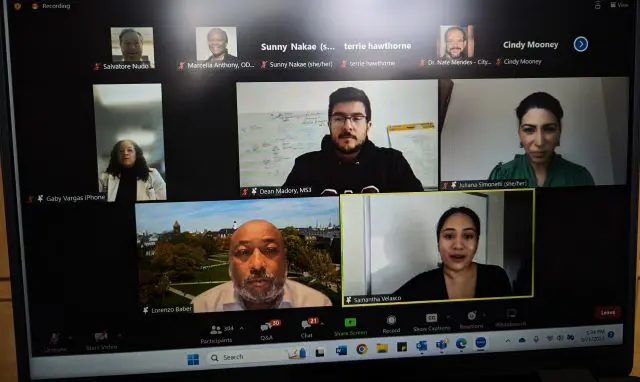
Panelist Gaby Vargas came to the U.S. when she was 9 years old and is now a colon and rectal surgeon in Washington. She was undocumented through most of her secondary schooling and did not have the needed financial support to further her schooling after high school, though she was working full time.
“Community college was what was accessible to be able to pursue higher education,” said Vargas, who knew she wanted to be a physician despite the obstacles. “This was just sort of the only way I saw to get my foot in the door and get a college degree.”
Dean Madory is a mentor for community college students who want to become physicians. He attended community college initially with the goal of becoming a firefighter, but later developed an interest in medicine. He switched to pre-med in community college, a key move in his education trajectory.
“I couldn’t have done it if I wasn’t going to community college,” Madory said. “I transferred to the University of California, Irvine and I’m in my third year of medical school now.”
Perhaps the most nontraditional postsecondary education route related by the panelists came from Samantha Velasco, who dropped out of high school and worked full time for eight years afterward. She attained her GED and eventually returned to school by enrolling in a community college in her mid-20s, not knowing the medical field was an option for her.
“I’m first-gen, so I had no idea the path I could walk, what my future trajectories could look like,” said Velasco, who is now a medical-school applicant. “But when you’re at a community college, you’re told, ‘Hey, you could be a nurse or a respiratory therapist.’”
After pursuing varied majors, Velasco settled on psychology and earned a bachelor’s degree at the University of California, Riverside. A determining factor in the undergraduate field she chose was seeing her first-ever Latina doctor – at the age of 28.
A few of the panelists related how the varied backgrounds and diverse populations at the community colleges they attended gave them comfort and made them feel supported. That in-it-together environment, they said, led to student peers pushing one another to earn their associate’s degrees and pursue further postsecondary education opportunities.
Some of the points made by the panelists reinforced the inferior-education stigma community colleges face on all levels, a seemingly never-ending narrative that Dr. Baber said was false.
“There’s no evidence in it,” Baber said. “From a research perspective, the evidence is the opposite. Community college students, once they transfer to a four-year institution or move on in the educational pathway, do better than students who start out at the four-year institution.”
More than once the panelists pointed out how educators at community colleges are highly focused on teaching and that classroom sizes are smaller, in contrast to larger institutions in which research is sometimes a heavy priority and students often feel like a mere number among many.
Along with joining clubs that he cared about, Madory said he formed invaluable personal relationships with some of his community college professors that have lasted to this day.
“I think all of my letters of recommendation came from my community college [professors] because these were people who knew me really well and who cared about me personally,” he said.
Of course, no institution is perfect, and Dr. Baber asked the panelists about some of the worst advice they received from their community college instructors or advisors. Panelists talked about professors who were less than encouraging in supporting them in the medical-school path, counselors who didn’t know much about the medical-school path, and an overall ignorance regarding what credits transferred to a four-year institution and what classes needed to be taken.
Though her path in education was winding and not always well-conveyed to her, Velasco couldn’t think of bad advice she received during her community college years. In fact, she was inundated with a lot of good advice, which included a few nuggets she helped end the session with.
“Don’t let anyone tell you that you can’t do what you set your mind to coming from a community college,” she said. “You determine the outcomes of your life. Sometimes it’s a little bit of a harder path, a lot more mountains to climb, but we’re going to get to medicine. We’re going to be physicians.”
